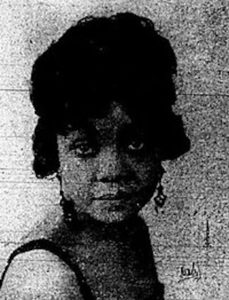
Gonzell White
*Gonzell White, also known as Gonzelle White, was born on this date in 1897. She was a Black jazz, blues, and vaudeville performer in the United States.
White was born in Chicago, Illinois. She also performed as a blues, jazz, and burlesque act and was first mentioned in reports in 1912 and specifically as a blues singer in 1914. She sang in various groups, including as a duo with Edward Lankford, also her manager. They married in Kansas in 1920. She toured on multiple circuits and acts, including with Lester Moore as White and Moore. Count Basie toured with her group in the mid-1920s. Basie described her as "more of an entertainer than a musician... She was a real pro with a lot of class... She was very light-skinned... the kind of small, nice-looking woman that you think of as being very cute. And, of course, she always wore fine, stylish clothes and costumes, and she also sported a diamond in one of her front teeth."
The entertainer Pigmeat Markham was a member of her troupe in the mid-1920s, and Gus Aiken also toured with her. She performed at Proctor's Theatre in Schenectady, New York, and her show toured Michigan. The Chicago Defender ran notices and reviews about White and her group, including photographs. She was part of the Booker T. Washington Stock Company. Billboard also reviewed Gonzelle and her group several times. White toured various circuits, including Cuba. In Cuba, she headlined as a singer and saxophone player. Her group included several influential acts. She was featured in advertisements for Exelento Quinine Pomade (a pomade). Lankford died while they were on tour in 1926. White's later life and death are publicly unreported.